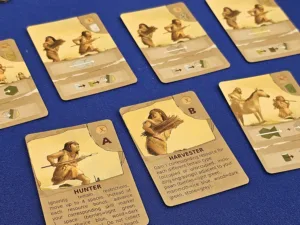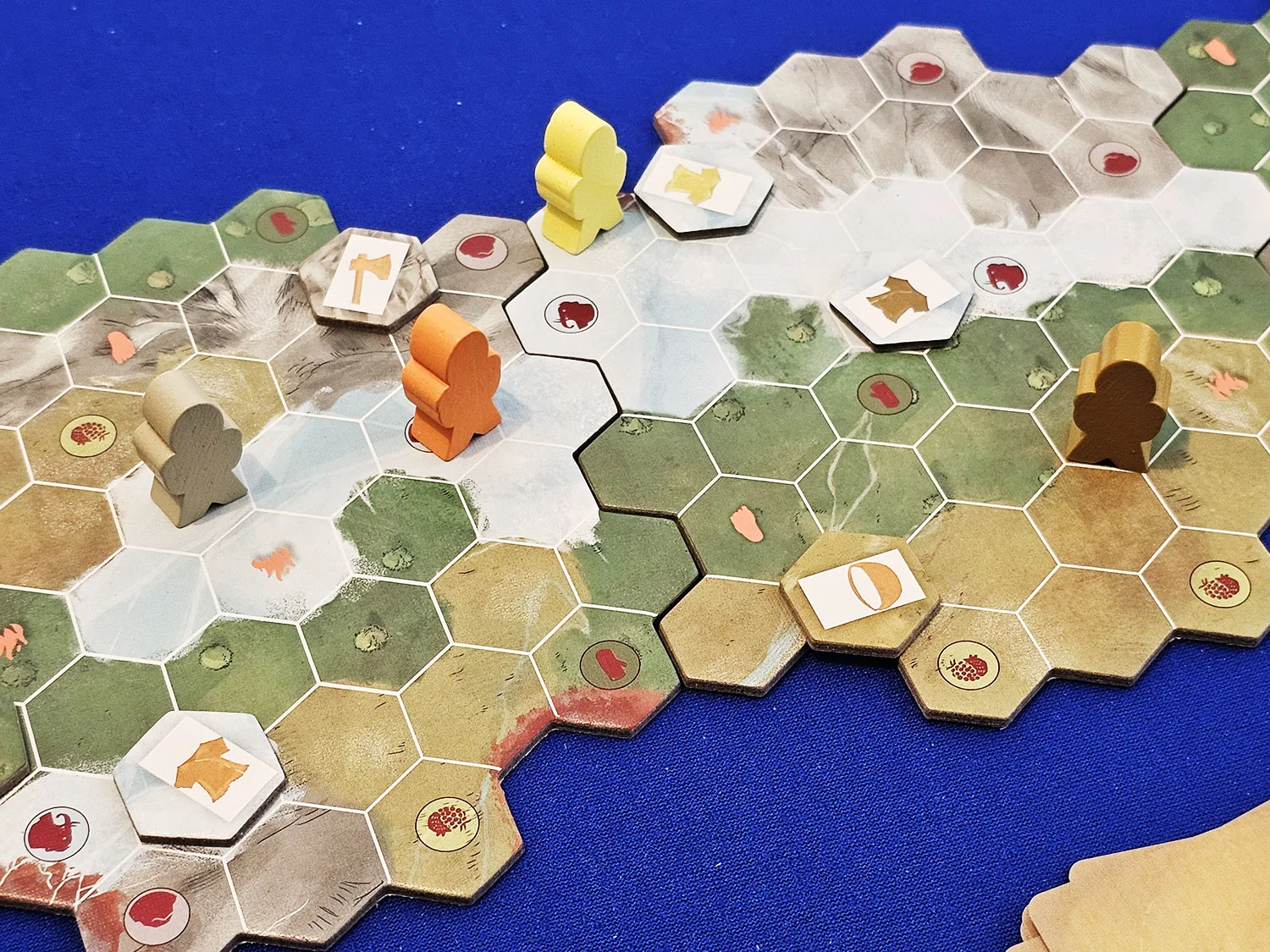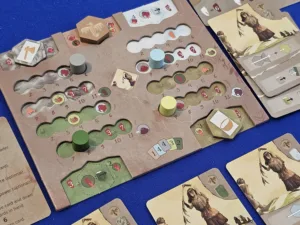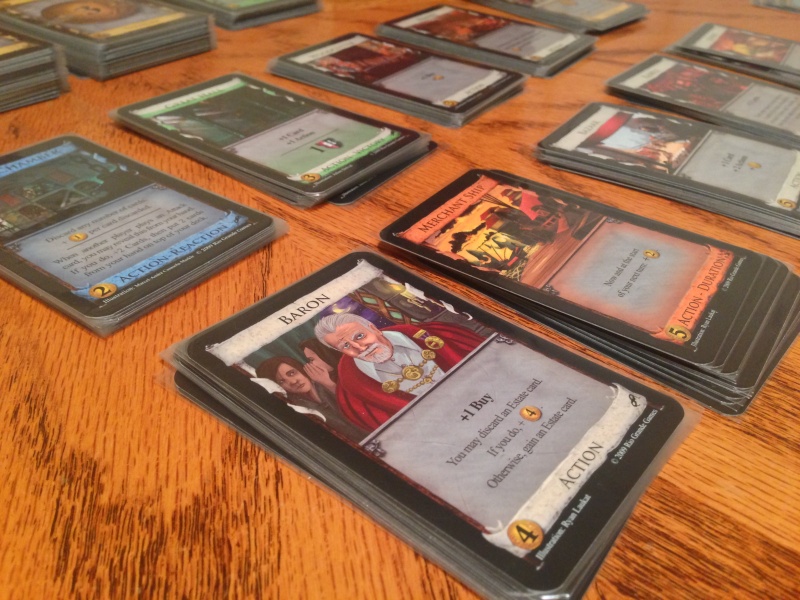 When I first heard that a game called Footprints was next in my review queue, I assumed it was going to be one of those beautiful small box games with art by Beth Sobel in which players are strategically placing footprints of varying pressure and size into a grid that resembles a calm beach scene. Not really sure why that’s where my mind went, but that’s a topic for another day.
When I first heard that a game called Footprints was next in my review queue, I assumed it was going to be one of those beautiful small box games with art by Beth Sobel in which players are strategically placing footprints of varying pressure and size into a grid that resembles a calm beach scene. Not really sure why that’s where my mind went, but that’s a topic for another day.
Instead, what I got was a hand-management game with its theme firmly rooted in the struggle post-ice age humans had as they tried to survive a changing landscape. Now, none of that is overtly tied to the theme (and I still question the title overall—do you leave footprints on rocky terrain?), but regardless that’s what this game is about.
Footprints is designed by Eilif Svensson, Åsmund Svensson, and Geir André Wahlquist for 1-6 players who should budget roughly an hour or so to play.
Gameplay Overview:
Footprints is a resource- and hand-management game in which players will move across a hexagonal grid to collect said resources and turn them in to mark their territory (in the least gross way possible). To move along the terrain, players will be using the 13 cards associated with their Clan as well as a single leader card. Each of these cards has specific terrain types that the players can trigger to move and a bonus action that will improve player abilities on their board for a future turn, thereby increasing their movement range for a given terrain.

Except in certain circumstances, players must choose either the movement action or the upgrade action on each turn. The players also have a leader card with a special power that will be triggered just once during the game. As players progress along the board they will pass spots that grant them resources in the form of food and animal remains and so on. (They’re just circular tokens in practice, but if you really want to dive into the theme, by all means go for it.)
As part of their turn, players can use these resources to engrave terrain adjacent to their player token. Each player has one engraving associated with each of the game’s four terrains. These engravings give the players a special power they can use on a future turn, which is usually a resource conversion of some kind. The variable game board also has cave locations along some of its edges. This is another type of engraving (albeit with a fancier designation and token) and it is the most valuable; it offers a multiplier to a certain aspect of endgame scoring.
Footprints also has Fire and Footprint cards. The former of these offers players a bonus action they are able to take on their turn and the latter represents goals that players can achieve during the game, but there will be a penalty for every Footprint card left uncompleted.
The game will end for each player at different points, but always when they are out of cards in their display or if they’ve reached the end of the main game board. Getting to the end of the game board gives a significant spike in points for those who get there first. Players will then tally their points and whoever has the most is the best human.

Game Experience:
The first thing that occurred to me as I started my first game of Footprints was that it was going to go quick. In fact, set up takes almost as long as playing the game.
On its face, the game seems straightforward. Move this many spaces, grab this many resources, next player’s turn. Playing in this way will surely leave you without much of a chance of winning but will provide a very breezy endeavor nonetheless.

The depth in this game, such as there is, lies in in maximizing every turn in the most intelligent way possible. More than once, I didn’t plan ahead properly and found myself stranded in a chunk of terrain because I didn’t properly identify what I needed on my next turn.
That being said, for those players who are less concerned with dominating strategically, playing casually and fast is a pretty fun experience. If your frustrated by losing badly, however, this is not the way to play because we did experience some runaway leader issues when new players were up against more experienced ones.
Drilling down more specifically on what I think are some of the game’s shortcomings, I do wish some of the turns had more of a different feel to them. Even when maxed out in terms of available options, all player’s turns follow a nearly identical cadence. On the one hand this is good because downtime is limited, even at the games remarkable full 6-player complement, but on the other hand this creates a repetitive feel to the game overall.

There’s almost never any reason to pay attention to anyone else’s turn at the table because it is effectively going to go the same way as your own. There is player blocking in terms of spaces and you can theoretically pinch in and prevent someone from putting an engraving over a space they want, but that is almost never the optimal play, and focusing on what you’re doing by yourself usually serves a player better. (Side note: I also played the solo game several times and it is a pleasant efficiency puzzle with a beat your own score system. Nothing fancy and maybe something I won’t revisit too much, but it plays just fine.)
Final Thoughts:
I went into Footprints expecting nothing from it. As a reviewer, that’s probably how I should go into every review but that simply isn’t possible for those of us that follow the hobby’s major releases. On that level, Footprints was something of a minor hit for me. I’m not convinced I’ll think much about it in a year or two or that it will stay in my collection forever but its decent theme, low rules overhead, and above average components were a pleasant surprise for me.
Final Score: 3.5 Stars – A pleasant and easy-to-table game that admirably does exactly what it sets out to do.
 Hits:
Hits:
• Plays fast, even at six players
• Maximizing efficiency puzzle helps with replay value
• Solid components
Misses:
• Turns can feel the same for all players
• Rulebook is decent, but oddly laid out for what is a pretty simple game to learn






















